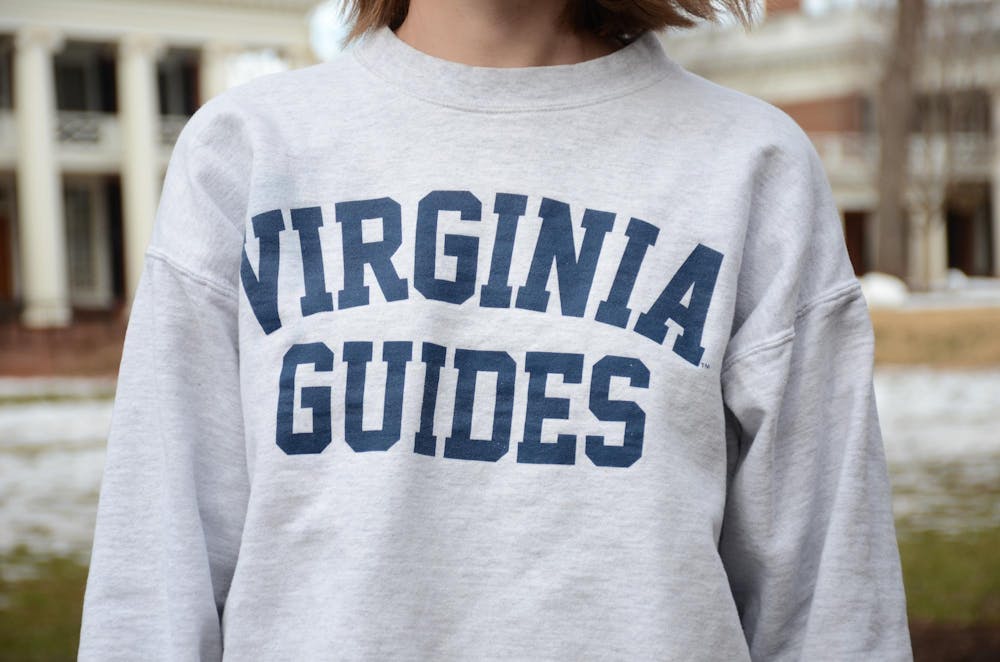Leaders from University Guide Service discussed their future following the organization’s termination as a Special Status Organization. In an event Monday hosted by both the Guide Service and The Civil Discourse Initiative — a student group dedicated to initiating dialogue around polarizing issues — a panel of Guide Service leadership spoke on their frustrations over a lack of communication from University administration following their suspension and eventual termination. They also warned of the dangers of curbing historical education of the University.
Jack Giese, Guide Service co-chair and fourth-year College student, Ella Sher, Guide Service vice chair and fourth-year College student, and Nina Accousti, Guide Service historian and third-year Architecture student, participated in the panel. Marty Dwyer, member of CDI and second-year College student, moderated the conversation.
The Guide Service currently provides historical tours independently of the University Friday, Saturday and Sunday at 11 a.m. following the suspension and then termination of their Special Status Organization agreement.
During the event, the panelists reflected on the history of the organization prior to the suspension. According to Accousti, the Guide Service has provided tours for over 70 years, and for much of this time, they provided both admissions and history tours as an SSO — meaning this service was provided on behalf of the University.
As an SSO, the Guide Service relied on the Office of Admissions to facilitate the administrative side of admissions tours. As evidence to justify the suspension, administration cited a “high-profile” event in which few guides showed up to provide tours for a large group, an incident attributed to an administrative error and not due to an error on the part of the Guide Service, according to Giese. He also said that the Guide Service took more issue with the University’s claims against the tours’ quality.
Giese said the Guide Service consistently acknowledged room for improvement in their tours and expressed a willingness to work with administration to fix aspects of the tour in accordance with their suggestions during routine feedback sessions. Sher added that administration seemed unreceptive when meeting with the Guide Service leaders leading up to the suspension.
“It definitely did not feel like dialogue,” Sher said. “We basically sat down and they were like, ‘you guys are unreliable, you guys lack comprehensiveness … [and] that there’s no opportunity for you guys to do your jobs that you were elected to do.’”
University administration never gave specific reasoning for suspending the historical tours despite repeated requests, although the administration eventually cited “comprehensiveness” as reasoning for historical tour suspension, according to Giese. He added that administration seemed scared to have these “difficult” conversations, both about addressing the University’s history and with the Guide Service about the issues they held with the tours’ content.
“It takes courage to speak history, and what’s wrong with all this is it just feels so scared,” Giese said.
According to Accousti, administration may have been attempting to standardize the tours when they cited comprehensiveness as a primary concern. She pushed against this notion, saying that the variability of experiences each guide provided by infusing their own personality and experiences uniquely gave the Guide Service its character.
“The magic of Guides is that no guide’s tour is the same,” Accousti said. “[Standardization] kills the magic that a student voice brings to talking about history rather than an administration talking about history.”
The University is taking this semester to plan a self-guided tour, and according to both Giese and University leadership, offered to involve the Guide Service. The Guide Service was hesitant, instead hoping for a statement ensuring that the self-guided tour would not effectively replace the live tours that guides provide.
Giese said their ideal partnership with the University would include sanctioned tours, minimal funding and a general feeling of support and trust from the administration. In a referendum sponsored by individual members of the Guide Service on the spring Student Elections, the Guide Service also requested increased funding from the University.
Giese added that he thought administration was not upholding the ideals of student-governance the University claimed to value by attempting to restrict student voices on the topic of their school’s history. The University, in a statement to The Cavalier Daily, said that the Guide Service had sought more independence than an SSO agreement typically allows.
The Guide Service will continue to provide an account of the University’s history told by students through its weekend tours and hopes to re-enter the space of admissions tours if granted permission with promises of autonomy from administration.







